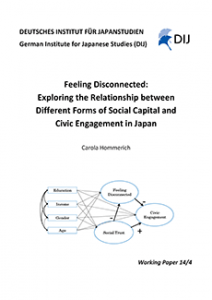Feeling Disconnected: Exploring the Relationship between Different Forms of Social Capital and Civic Engagement in Japan

This paper analyzes the role of social connectedness in motivating citizens to take an active interest in society and to engage in communal activities. Japan is used as an example of a society which has been diagnosed with a weakening of social bonds, as well as with an increase in social inequality and precarity in recent years. Structural equation modeling was applied to data of a nationwide survey from 2009, to test the assumption that feelings of disconnectedness from society exert a negative effect on civic engagement that needs to be differentiated from effects of general social trust. Results support this hypothesis and further indicate that it is not socioeconomic precarity per se that lowers chances for civic engagement, but its negative impact on the subjective evaluation of both the quality of social networks and one’s belonging to and value for society. As precarity, however, enforces the negative effects of low social capital, this implies that it is especially the socially disadvantaged who are less likely to participate.